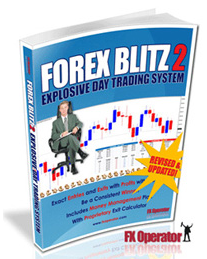Practice Defensive Forex Trading
“In trading, Risk is Pre-Determined but Reward is Un-Predictable. Your Stop determined your risk. The Market decides your reward. Success in trading is supported by your discipline, diligence and decided by your Money Management and Psychology.,” - Henry Aw Young, Singapore
Henry is a good friend of mine with whom I met in Adam Khoo's Wealth Academy Program in 2008. He is also a professional trader and a trading coach.
As you can see, people who have been proper trading education will say something like the above. Always determine the risk before looking for the reward. Establish the pain threshold with informed decision right before placing the trade and know how much we will lose in a particular if we are wrong first before asking how much money we can make if we are right.
Amateur traders could find it hard to accept. They tend to ask "if trading is for money, why should they not take about how much they can make in a trade?" Well, the answer is fairly simple. If we are in a trade without knowing the maximum pain threshold, and if we are wrong in that trade, emotion will drive us crazy, and we will start giving excuses so that we can delay our pain until such time as we cannot. By that time it will be too late to get out of the losing position, and the traders might as well not exit the trade. The probable outcome s that the traders have their accounts wipe out and curse and swear that they shall not trade anymore because the market is unfair to them.
Does this sound familiar to you? You should have heard in the recent bear market where many people lost tons of money because they approached this business in a completely incorrect manner.
So, who in the market right now are still making money? I guess people who have been educated properly and practice defensive trading. And what do I mean by defensive trading? Let's draw some indications below:
1. Always find a reason not to trade, and if you find one, then, you are out of the market. This helps us to focus on quality set-up / pattern and at the same time, kick away emotional trading.
2. Always address stop loss first before looking at the profit. Yes, it is completely reversed. The advantage of this is by ascertaining the stop loss, you will be able to determine the proper position sizing, and risk allocation. If you find that the stop loss is something you are not comfortable, you have found another reason to stay out of the market.
3. Trade based on your trading personality. I know this is a challenge. Some of us tend to trade in a shorter time frame. I am one of them. When I talk about shorter time frame, I mean it is short in my own definition. For example, I trade forex by using at least a 5-min chart and at the same time. 1 min-chart is too short in my definition.
4. Do take into account of bid/ask spread. Very often, we tend to look at the upside of an individual trade and when taking into account the spread, the result can look very different. So, remember to incorporate bid/ask spread in your trading result so that it becomes more realistic.
5. Do your research and development. I would like to answer Chris' (JMOT's) questions here. I am a system trader because it is something I learnt from Tom Gentile, the co-found of Optionetics. I took Tom's traits in my trading business and very often, I blend a few systems which may give me better results. For example, if I take FAST2 to trade on USD/JPY, the accruacy may be somewhere between 65% and 75%. Knowing that the win/loss ratio and the risk/reward ratio, most FX1 students may find it hard to make money on FAST2. Some of the students may start blaming FX1 and whoever on the planet saying that this course sucks.
In my case, I focus on how to better the system with a view to increasing the win/loss ratio. In my own R&D, I asked myself the following questions:
- Can I use some signals to filter out the less probable side of the trade? Put simply, if USD/JPY is on a short-term downtrend, and there is a long signal, should I take this trade blindly? This is why I incorporate Kathy Line's BB Band in my modified FAST2. So, if the pair is in the sell zone, I will concentrate on the short trades.
- Can I take into account support and resistance? Put simply, if USD/JPY gives me a sell signal, and at the same time, the profit target will face a strong support somehow in between, should I take this signal? Peter Bain and John Person are the gurus in pivot point analysis. There are also free MT4 code for daily pivot points. How about putting pivot points in the pair and filter out less probable trades? For example, this afternoon there was potentially a short USD/JPY trade and I decided not to trade. My PT was 92.20 and S1 is 92.24. So, I did not place the trade which eventually was proven to be a right decision becuase it really bounced back nicely at S1and moved all way to my SL and I would have registered a max loss on this signal.
So, these are some of my ideas to fine-tune the trading systems based on what I know. You may ask how the hell I know all of these. I can share with you that it is based on my hunger and desire to become the best forex trader in Singapore. That means I constantly look into my existing trading systems (and till now, I have at least 20 systems) and decide which of these are suitable in the given market condition. Unlike many amateur traders, instead of focusing the word "why?", I look at "how". With this little weeak of the question marker, I see a hell lot of oppotunities in forex market.
Another reader asked why I posted my daily forex record in my discussion board. I am not showing off of course. The sole purpose of doing this is to keep track which systems I use on a particular day, and how they performed. Of course, some of these systems are proprietary and thus I am not allowed to post the detail entry and exit rules. I need to respect the intellectual property of the inventor of the systems. At the same time, I have recently spent hell lot of time to forexfactory.com and singaporeforexforum.com as there are tons of free traidng systems and some of them provide MT4 codes. So, if you are committed to be the best of the best, you must decide for yourself what you should do.
Have fun in your forex venture!
Subscribe to:
Post Comments (Atom)


















No comments:
Post a Comment